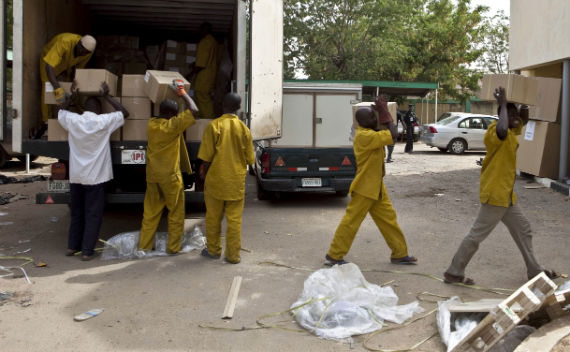Nigeria--Also Cote d’Ivoire
More on:

On Saturday, after voting in some areas was already underway, Independent National Elections Commission chairman Attahiru Jega postponed the first round of Nigeria’s elections. Now, Nigerians will vote April 9 for the National Assembly, April 16 for the president, and April 26 for governors and local officials. Jega delayed the voting because voting materials, especially results sheets, had not been distributed on time throughout the country. However, there is at least one press report that some 15 million Nigerians had already cast their vote before Jega stopped the polling. Though by and large non-governmental organization spokespersons are supportive of Jega’s postponement and are rallying behind him, there have also been scattered calls for him to resign. Many Nigerian commentators express concerns that sensitive voting materials--such as ballots--are already in the field, enhancing the possibility of fraud. In their public statements, some Nigerian election monitors are calling on Jega to investigate whether the non-delivery of results sheets was a deliberate attempt to sabotage the elections. But, if true, by whom and for what purpose?
According to Jega, ballots and results sheets were on time in Lagos, Kebbi, Delta, Zamfara and Enugu, and there have been reports that the polling in at least some places was going well before it was stopped. However, the interruption and postponement of the voting may provide a basis for those who will not accept the final results and argue that the elections lack credibility.
These elections have generated an exceptional level of excitement and participation by the electorate, bearing in mind that Nigeria is a huge country with poor communications. Hence, it is too early to tell what the popular reaction will be to the postponement. Moreover, according to the media the postponement has engendered confusion, but no significant violence. Thus far, Nigerians appear to be giving Jega the benefit of the doubt.
Meanwhile, in Cote d’Ivoire what friends of Africa have feared is happening: resumption of civil war, especially in Abidjan, with potentially horrific humanitarian consequences. So far as I can tell, there is no relationship between Nigerian election issues and the Ivorian civil war. However, it will be recalled that the current Ivorian crisis was initiated by incumbent president Gbagbo’s refusal to accept the results of the November, 2010 elections, which the international community endorsed.
More on:
 Online Store
Online Store